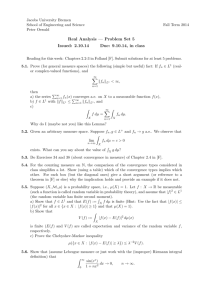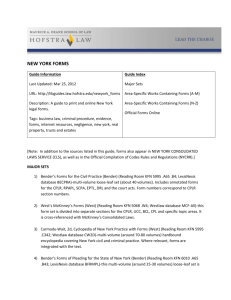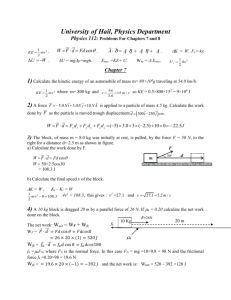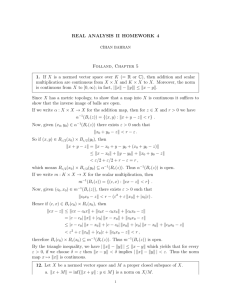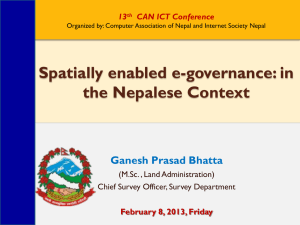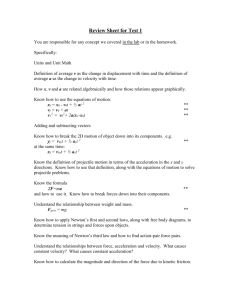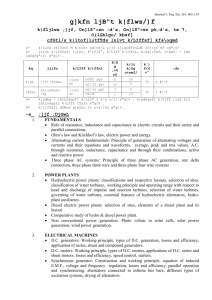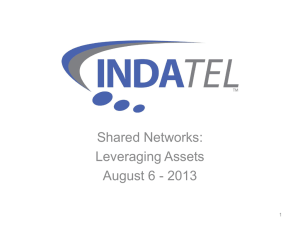Traditional Knowledge Policy Draft
advertisement
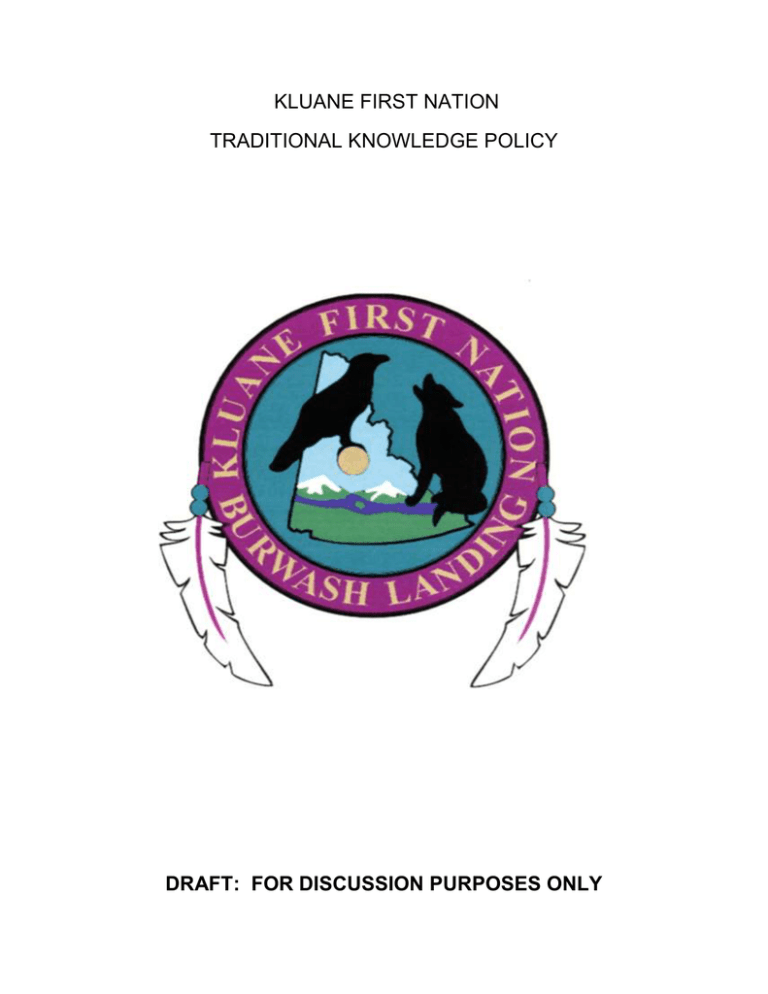
KLUANE FIRST NATION TRADITIONAL KNOWLEDGE POLICY DRAFT: FOR DISCUSSION PURPOSES ONLY TABLE OF CONTENTS 1. PURPOSE AND APPLICATION OF THIS POLICY ............................................................ 4 2. DESCRIPTION OF TRADITIONAL KNOWLEDGE ............................................................. 4 3. PRINCIPLES ....................................................................................................................... 4 4. DEFINITIONS ...................................................................................................................... 5 5. GENERAL POLICIES ......................................................................................................... 6 6. KFN GOVERNMENT TRADITIONAL KNOWLEDGE HOLDINGS ...................................... 7 7. PRIOR INFORMED CONSENT TO USE TRADITIONAL KNOWLEDGE ...........................10 7.1 CONSENT FROM KFN GOVERNMENT TO USE TRADITIONAL KNOWLEDGE ..............................10 7.2 CONSENT FROM CITIZENS TO USE THEIR TRADITIONAL KNOWLEDGE ....................................11 8. ACCESS TO TRADITIONAL KNOWLEDGE .....................................................................11 8.1 ACCESS TO KFN GOVERNMENT TRADITIONAL KNOWLEDGE HOLDINGS.................................11 8.2 REQUESTING ACCESS TO CITIZENS HOLDING TRADITIONAL KNOWLEDGE ..............................13 9. PROJECTS USING TRADITIONAL KNOWLEDGE ...........................................................14 10. PROTECTING RIGHTS TO TRADITIONAL KNOWLEDGE .............................................15 11. EDUCATION AND COMMUNICATION ............................................................................17 12. AUTHORITY AND ACCOUNTABILITY ............................................................................18 13. MONITORING AND ENFORCEMENT ..............................................................................18 14. REVIEW ...........................................................................................................................19 APPENDIX 1 – KLUANE FIRST NATION PRIOR INFORMED CONSENT STATEMENT.............................21 APPENDIX 2 – KLUANE FIRST NATION GOVERNMENT PROTOCOL FOR CONDUCTING TRADITIONAL KNOWLEDGE RESEARCH OR ACCESSING TRADITIONAL KNOWLEDGE ............................................23 DRAFT: FOR DISCUSSION PURPOSES ONLY Page 2 APPENDIX 3 – PRIOR INFORMED CONSENT TO USE TRADITIONAL KNOWLEDGE IN THE KLUANE FIRST NATION GOVERNMENT HOLDINGS ...............................................................................................29 APPENDIX 4 – KLUANE FIRST NATION GOVERNMENT CHECKLIST FOR EVALUATING REQUESTS TO USE TRADITIONAL KNOWLEDGE ..................................................................................................31 APPENDIX 5 – KLUANE FIRST NATION GOVERNMENT RESEARCH GUIDELINES ...............................33 APPENDIX 6 – KLUANE FIRST NATION GOVERNMENT CONTRACTUAL AGREEMENTS, TERMS ..........34 DRAFT: FOR DISCUSSION PURPOSES ONLY Page 3 1. Purpose and Application of This Policy The Kluane First Nation (KFN) Government has adopted this Traditional Knowledge Policy (the “policy”) in order to start discussion and consultation to further develop and strengthen the protection and preservation of its traditional knowledge. This policy applies to the KFN Government, its employees, contractors and members of its Kluane First Nation Council, Elders Council and Youth Council and committees established by the KFN Government and its Self-Government Agreements. 2. Description of Traditional Knowledge Review NNDFN Language The Kluane First Nation at this time does not want to adopt an official definition of Traditional Knowledge. Therefore for the purpose of this policy KFN adopts the following description of Traditional Knowledge: hunting and fishing sites spiritual sites pictographs, petro glyphs symbols traditional or sacred songs and stories medicinal plants (which could be used to market new medication or cosmetics) genetic information and resources (DNA from human remains) First Nation’s place name (which tells a story, legend, history or other TK values and beliefs) Traditional knowledge originated in the First Nation’s traditions, constantly evolves over time, and has contemporary applications. It was suggested that we look at the Parks Canada definition for Traditonal Knowledge Sacred ceremonies (eg: potlatches) Traditional Knowledge is only within KFN Traditional Territory (place specific – such as Kloo Lake) 3. Principles The following principles will apply to the use and management of the First Nation’s traditional knowledge that is held by KFN Government and its citizens: The protection, preservation and promotion of a community’s traditional knowledge are the responsibilities of both the citizens, of the First Nation, and KFN Government. DRAFT: FOR DISCUSSION PURPOSES ONLY Page 4 KFN Government is responsible for protecting the cultural, political, and economic distinctiveness and social well-being of its citizens, which include the traditional knowledge of the First Nation. KFN Government will consider traditional knowledge in the design, implementation, and delivery of its programs and services in a manner that ensures, to the extent possible, the integrity of traditional knowledge. What about Acts and Policies? KFN Government will maintain holdings of documented traditional knowledge to protect, preserve, and manage the use of traditional knowledge. Third parties outside the First Nation community may only use traditional knowledge after they have received the prior informed consent of the Kluane First Nation Government or the citizen(s) who holds the traditional knowledge. Signed Agreement The application of this policy is not intended to abrogate or impair the traditional or on-going uses of traditional knowledge by citizens of the First Nation. KFN Government will develop education materials for its employees and citizens, as well as for third parties and other Governments, to explain this policy and to support its effective implementation. The implementation of this policy will assist in the implementation and enhancement of the provisions of the final agreement and self-government agreement that incorporates aspects of the First Nation’s traditional knowledge. The First Nation’s languages plays an important role in Traditional Knowledge and the cultural integrity of the KFN people, as such, it must be respected, acknowledged and preserved under its own context and policy. Only First Nation place names will be referenced to in this policy. There was a suggestion that Curriculum Development needs to be included – development of TK curriculum materials and Audio Video materials. 4. Definitions The following definitions apply to this policy: “citizens” has the same meaning as in the Kluane First Nation Constitution. mean the citizens of the First Nation as determined by the Kluane First Nations citizenship code set out in the Kluane First Nation’s Constitution and Final Agreement; “documented traditional knowledge” means records, regardless of physical form or characteristics, that include traditional knowledge including correspondence, memoranda, books, plans, maps, drawings, diagrams, pictorials or graphic works, DRAFT: FOR DISCUSSION PURPOSES ONLY Page 5 audio or visual recordings, photography, films, geographic information systems, electronic scanning, or any other technique used to make a physical or digital record; “KFN Government” means the KFN Government as established by the Kluane First Nation’s Constitution; “final agreement” means the Kluane First Nation’s Final Agreement; “prior informed consent” means consent to an activity that is given after receiving full disclosure regarding the reasons for the activity, the specific procedures that activity would entail, the potential risks involved, and the full implications that can realistically be foreseen; “self-government agreement” means the Kluane First Nation’s Self-Government Agreement; “third party” means the individuals, organizations, corporations, researchers, Federal Government, Yukon Territorial Government, Municipal Governments and other First Nation Governments including any regulatory board or agency established by these respective organizations; “traditional knowledge” for this policy means the Traditional Knowledge description on page 4. 5. General Policies The following general policies will guide KFN Government, its staff, contractors and members of its Kluane First Nation Council and other governing bodies: 5.1 KFN Government shall be the body responsible for the development and implementation of all aspects of this policy. 5.2 KFN Government will provide effective communication and education about this policy to all KFN Government employees and contractors, its citizens, other First Nation organizations, all other Governments, and to third parties affected by decisions under this policy. 5.3 KFN Government will use this policy as part of its broader political, legal and regulatory strategy to protect, preserve and manage the use of traditional knowledge. 5.4 KFN Government is responsible for the management and safeguarding of traditional knowledge in its care. 5.5 KFN Government will be the primary point of contact for third parties to access traditional knowledge from either KFN Government holdings or First Nation citizens. DRAFT: FOR DISCUSSION PURPOSES ONLY Page 6 6. KFN Government Traditional Knowledge Holdings Background The primary source of traditional knowledge is the community and its citizens. However, the KFN Government has a responsibility to protect its citizens and the shared heritage of the community’s traditional knowledge. Also, the KFN Government maintains holdings of documented traditional knowledge. An objective of this policy is to establish the KFN Government as the primary point of contact respecting access to traditional knowledge belonging to the community. As such, the KFN Government must establish effective safeguards and information management systems that enable it to collect and hold information and to ensure access to and use of traditional knowledge is appropriate and respectful. KFN Government’s traditional knowledge holdings must be organized, catalogued, and indexed in such a way as to be searchable, accessible and capable of sharing based on identified terms and conditions. Having a well-catalogued and indexed collection will enable KFN Government to assess whether a request can be met by information in the holdings, or whether new research is required, and to identify research priorities. KFN Government and the KFN Traditional Knowledge (TK) Committee will determine the levels of accessibility of their holdings. KFN Government and the KFN TK Committee will determine the sensitivity of the traditional knowledge in their holdings and depending on the levels of sensitivity, KFN Government may restrict the access to and use of the information. KFN Government must keep some information confidential. KFN Government must assess the implications of making traditional knowledge public. Traditional knowledge is not considered confidential if it is in the public realm. KFN Government must maintain the integrity of the traditional knowledge in these holdings so it is available for future generations and retain its value to the community. KFN Government must ensure the quality of traditional knowledge for use in applications such as environmental assessments. Policies 6.1 KFN Government or KFN Heritage Branch will house the documented traditional knowledge in it’s KFN Government’s possession, which will be defined as the “traditional knowledge holdings”, in an appropriate manner (KFN Government will specify the nature of their holdings, e.g., database, archives). Note: if we use the KFN Government (blue) and it’s (blue) and delete KFN Government’s DRAFT: FOR DISCUSSION PURPOSES ONLY Page 7 6.2 In order for KFN Government to assess whether recorded traditional knowledge is of an appropriate standard and quality to be included in its holdings, and to manage access to the traditional knowledge holdings, it will require details about the following to be included with the traditional knowledge in its holdings: Research methods used to collect traditional knowledge; Confidentiality requirements identified by the holder of traditional knowledge or determined during collection of traditional knowledge; Statement of prior informed consent and any attached terms and conditions provided by the citizen who originally shared the knowledge or, if that is not possible, by another citizen who the First Nation considers appropriate; Sensitivity of traditional knowledge as identified by the holder of the traditional knowledge, and/or according to customary laws of the First Nation: - Low sensitivity – e.g., information commonly known outside the First Nation; - Medium sensitivity – e.g., information known only to those within the traditional circle of the First Nation; - High sensitivity – e.g., spiritual information known only according to customary laws or information which might harm the First Nation or its citizens if it was released. 6.3 Taking into account the parameters identified in 6.2 and any proprietary considerations (Section 9), KFN Government will identify the appropriate level of disclosure and any associated conditions or limitations on disclosure for the traditional knowledge in its holdings: full disclosure – access with few or no limitations; partial disclosure – partial access, with such limitations as: in-house access only; - no reproductions; - no electronic exchange of information; - only certain types of uses allowed; and - certain portions of the information may be blacked out or deleted from documentation provided. no disclosure – information is confidential and is not released or disseminated outside of KFN Government. KFN Government should will designate staff in the Heritage and Education Department and Lands Department who can view information requests and information under consideration. DRAFT: FOR DISCUSSION PURPOSES ONLY Page 8 6.4 KFN Government will protect all confidential information in KFN Government holdings against unauthorized access, collection, copying, use, disclosure, retention, and disposal through security measures and records management. These measures may include: limiting access to information only to authorized employees; specify which additional persons may have access to the information; allowing users only to view information (no copying or distribution). 6.5 KFN Government will protect confidential information in electronic databases using means such as allowing sign on only by authorized staff, and using individual and confidential passwords and read-only formatting. 6.6 Where the level of disclosure has not been assessed, KFN Government will treat traditional knowledge holdings as confidential. (It should be recognized in the policy that a certain level of common sense should be applied to this assessment – KFN Government should determine how it will assess the sensitivity of information held in the KFN Government holdings). 6.7 KFN Government will inform all employees, contractors, and members of boards or committees of disclosure limitations and confidentiality requirements set out in this policy contractor policy, personnel policy and oath of office policies. Failure to comply with these policies may be grounds for dismissal and further action. (First Nation may wish to have noted for the records that all members have been informed of this requirement; it may require confidentiality statements; and may require that failure to protect confidentiality may be considered grounds for dismissal in accordance with other personnel policies). 6.8 Prior to the KFN Government agreeing to the disclosure of traditional knowledge to a third party, KFN Government will require an agreement with the third party identifying the level of disclosure, the terms and conditions for sharing the information, the steps the third party will take to ensure confidentiality (when required) is maintained, and the purpose for which the traditional knowledge can be used and ultimate ownership of traditional knowledge that has been gathered. 6.9 KFN Government employees and contractors who have acquired traditional knowledge while in the employ of the KFN Government shall seek the prior informed consent of the original holder of the traditional knowledge prior to placing that traditional knowledge in the KFN Government holdings. 6.10 Wherever possible, the KFN Government will make efforts to repatriate materials pertaining to traditional knowledge in collections outside the First Nation to its holdings. DRAFT: FOR DISCUSSION PURPOSES ONLY Page 9 6.11 KFN Government will maintain the integrity of its traditional knowledge holdings by ensuring only data collected and stored in keeping with this policy is included in its holdings. 7. Prior Informed Consent to Use Traditional Knowledge KFN Government and citizens are not obliged to share their traditional knowledge. They can decide whether to share the information and on what terms to share it. KFN Government and citizens must have the opportunity to decide whether to give consent to the use of traditional knowledge, and to make this decision after being fully informed as to the nature and purpose of the use of its traditional knowledge. KFN Government and the citizens must have the opportunity to make this informed decision before any traditional knowledge is shared. 7.1 Consent from KFN Government to Use Traditional Knowledge Background KFN Government has a responsibility to protect traditional knowledge as the shared cultural heritage of the First Nation. It also has a responsibility to ensure its citizens are treated appropriately when they share their traditional knowledge. KFN Government will only allow access to its traditional knowledge holdings with prior informed consent. First Nation of Na-Cho Nyak Dun Government will also require third parties to obtain prior informed consent from its citizens prior to their sharing traditional knowledge. Policies 7.1.1. KFN Government will require a prior informed consent statement be in place before allowing access to any traditional knowledge from its holdings. 7.1.2. If a prior informed consent statement was provided with the traditional knowledge when it was entered into the holdings, KFN Government will determine appropriate access in accordance with the consent statement. 7.1.3. If the traditional knowledge in the holdings does not have a prior informed consent statement, or if a prior informed consent statement does not address aspects of the access required (Appendix 1) then the KFN Government will seek the prior informed consent of the individual who provided the information, or if that individual is no longer able to consider consent (e.g., deceased), then the KFN Government will determine whether consent from the original source is required or may determine culturally appropriate means of determining consent (e.g., according to customary laws) (Appendix 3). 7.1.4 KFN Government will require a prior informed consent statement (Appendix 1) be obtained prior to issuing any KFN Government authorizations for a project DRAFT: FOR DISCUSSION PURPOSES ONLY Page 10 that involves using traditional knowledge or working with the project proponent on a project. 7.1.5 In circumstances, where KFN Government is submitting documents that incorporate traditional knowledge to third parties, KFN Government will consider the context and purpose in which the document will be considered prior to submitting the document to determine whether the use of the document by third parties is consistent with the prior informed consent statement (Appendix 1) for the material within the document. 7.2 Consent from Citizens to Use Their Traditional Knowledge Background KFN Government will request third parties to obtain prior informed consent from its citizens when third parties are seeking traditional knowledge from citizens. Policies 7.2.1. KFN Government will request a citizen complete a prior informed consent statement prior to sharing traditional knowledge with third parties or for any use beyond the customary sharing of traditional knowledge with third parties or for any use beyond the customary sharing of traditional knowledge (Appendix 1). KFN Government may identify a KFN Government representative to accompany the third party when interacting with the citizen(s). 7.2.2. KFN Government will educate its citizens as to the importance of prior informed consent before sharing their traditional knowledge beyond the customary recipients. 7.2.3. KFN Government will request the party wanting to collect and use the traditional knowledge to provide a copy of the prior informed consent form signed by the citizen. 8. Access to Traditional Knowledge 8.1 Access to KFN Government Traditional Knowledge Holdings Background KFN Government must understand fully why traditional knowledge in its holdings is being requested, how it will be used, and who will be using it, before deciding whether to provide its informed consent to the proposed use. KFN Government must manage access to traditional knowledge and establish controls to protect sensitive traditional knowledge, to ensure traditional knowledge is handled appropriately, and to ensure First Nation citizens are treated respectfully. KFN Government must assess requests to determine whether to provide consent, the level of disclosure of DRAFT: FOR DISCUSSION PURPOSES ONLY Page 11 sensitive information, the degree of involvement by KFN Government, and the need for formal agreements with the user. Requesting Access to KFN Government Traditional Knowledge Holdings Policies 8.1.1. KFN Government KFN Heritage Branch will be the point of contact for inquiries – both internal and external to KFN Government – for access to KFN Government traditional knowledge holdings. 8.1.2. KFN Government will require all parties requesting traditional knowledge – both internal and external to KFN Government – to complete a First Nation Protocol for Conducting Traditional Knowledge Research or Accessing Traditional Knowledge (Appendix 2). (KFN Government may want to consider an exception for citizens who want access for personal use, not connected with their employment.) NOTE: (During the interviews members stated that there should be two processes: one for KFN members and one for non-KFN members.) 8.1.3. KFN Government KFN Heritage Branch will evaluate all requests to determine whether information is available in its holdings or whether collection of new traditional knowledge from citizens would be required. 8.1.4 KFN Government KFN Heritage Branch will evaluate requests and determine what access can be granted to traditional knowledge within its holding based on the level of disclosure of the traditional knowledge and the purposes for which it is to be used (Section 6). Granting Access to KFN Government Traditional Knowledge Holdings Policies 8.1.5. If traditional knowledge within its holdings can be disclosed, KFN Governnment KFN Heritage Branch will establish terms and conditions in keeping with the level of disclosure, which may include limitations on: time period of use; location of use; specifications regarding use; use for purposes other than original purpose; sharing beyond primary user; rights or interests associated with use. 8.1.6. KFN Government KFN Heritage Branch will put all grants of access in writing (Appendix 2), which will include terms and conditions regarding use and the measures that both KFN Government and the third party will take to ensure the required level of disclosure is respected. DRAFT: FOR DISCUSSION PURPOSES ONLY Page 12 8.1.7. KFN Government may require a confidentiality agreement, research agreement, or other contractual agreements, and/or legal intellectual property mechanisms are in place before allowing access to its traditional knowledge holdings (Section 10). 8.1.8. KFN Government will evaluate any requests for changes to access or use of traditional knowledge in accordance with this policy. 8.1.9. KFN Government may negotiate with third parties for an equitable sharing of monetary or non-monetary benefits arising from the use of the traditional knowledge by the third party. 8.2 Requesting Access to Citizens Holding Traditional Knowledge Background The primary source of traditional knowledge is the community and its citizens. The KFN Government recognizes that traditional knowledge may be shared with third parties through the participation of citizens in meetings, interviews or public consultations. Also, citizens may be approached directly and asked to share their traditional knowledge. In some cases, the information being requested may already be in the KFN Government traditional knowledge holdings and does not need to be collected again. However, in other cases, new traditional knowledge research may be required. In such cases, KFN Government or third parties may collect information by working directly with citizens. KFN Government wants to ensure the rights and interests of its citizens are protected in this exchange of traditional knowledge. Requesting Access from Citizens Policies 8.2.1. KFN Government employees or contractors requesting traditional knowledge from citizens will follow KFN Government research guidelines (Appendix 5). 8.2.2. KFN Government will assist those requesting traditional knowledge from citizens to determine whether information already exists in the KFN Government traditional knowledge holdings. 8.2.3. KFN Government will support its citizens by ensuring they are made aware of the principles and intent of the policy and its provisions, particularly the importance of and need to protect intellectual property interests they may have (Section 10) and ensuring that the prior informed consent of citizens is obtained (Section 7). 8.2.4. KFN Government will require a third party requesting traditional knowledge who wishes to have direct access to citizens, to agree that: all information gathered will be vetted by KFN Government to determine the level of sensitivity and to ensure the cultural integrity of the traditional knowledge is retained in the process of documenting it; and DRAFT: FOR DISCUSSION PURPOSES ONLY Page 13 copies of all information gathered will be provided to KFN Government to be included in its holdings (including videos, photos, recordings and printed materials). Included with this information will be prior informed consent documentation, confidentiality requirements, research methods, and the level of sensitivity determined for the traditional knowledge gathered during the project (Section 6). 8.2.5. KFN Government will endeavor as necessary to enter into further agreements with the third parties conducting the activities that lead to the accumulation of traditional knowledge, to protect the rights and interests of KFN Government and its citizens. 8.2.6. KFN Government may negotiate with third parties for an equitable sharing of any monetary on non-monetary benefits arising from the use of the traditional knowledge by the third party. Where appropriate or if requested, the KFN Government may assist or negotiate on behalf of traditional knowledge holders and/or the citizens of the First Nation. 8.2.7. KFN Government will promote understanding by third parties of the customs and practices associated with sharing traditional knowledge. 9. Projects Using Traditional Knowledge Background The user of traditional knowledge should avoid, when possible from taking the traditional knowledge out of its cultural context. This means the user of traditional knowledge, whether a staff member within the First Nation, or a third party, should recognize that traditional knowledge is more than just factual information, and appreciate and respect the sensitivity of the traditional knowledge, the time frames and manner in which it should be collected, the appropriate ways of using the data, and other customary requirements for the treatment and use of traditional knowledge. Policies 9.1. KFN Government will encourage and promote early communication with third parties when the KFN Government is aware of projects that may require the utilization of traditional knowledge. 9.2. KFN Government will determine the extent of its involvement in a project, and the contractual or other agreements required according to the nature of the project and the traditional knowledge being requested. Establishing good communications while in the early stages of planning a project will help the KFN Government assess the information that may be needed and help to determine the availability of sources of traditional knowledge. 9.3 KFN Government will require that third parties seeking traditional knowledge from the KFN Government or its citizens fill out the First Nation Protocol for Conducting DRAFT: FOR DISCUSSION PURPOSES ONLY Page 14 Traditional Knowledge Research or Accessing Traditional Knowledge (Appendix 2). 9.4 KFN Government will work with its citizens and elders to determine to what extent they want to be involved in a project, and the role delegated to staff in sharing traditional knowledge. Further consultation with the Elders Council will be required to determine the level of involvement and role they will play in various projects. (The role of an Elders Council regarding the sharing of traditional knowledge can be identified in individual First Nation policies). 9.5. KFN Government will request that all research utilize appropriate research methods for collecting and using traditional knowledge in accordance with the research guidelines set out in (Appendix 5). 9.6. KFN Government will request all parties using any of the First Nation’s traditional knowledge to provide KFN Government and, where appropriate, the holder of the traditional knowledge with the results of their traditional knowledge project. 9.7. KFN Government will encourage and support its citizens in their efforts to ensure traditional knowledge is treated respectfully and appropriately by keeping citizens informed of their rights and responsibilities regarding traditional knowledge, prior informed consent, and the principles and intent of this policy. 9.8. Depending on the level of sensitivity of traditional knowledge sought and the extent of information required by the third party, the KFN Government may work with the third party requesting the traditional knowledge to help establish project principles that are consistent with the principles of this policy. 9.9. In situations where traditional knowledge is being accessed directly from citizens by a third party, the KFN Government may work with the parties to develop guidelines to help ensure that traditional knowledge collected by the third party is handled appropriately. 10. Protecting Rights to Traditional Knowledge Background The extent to which intellectual property rights and mechanisms can be used to protect traditional knowledge is limited under Canadian law. KFN Government may not have intellectual property rights to all of the traditional knowledge in its holdings; however, KFN Government should preserve whatever rights and interests it does have, and avoid alienating any possible rights that may be established in the future. Policies 10.1. KFN Government will assess its rights and interests including any intellectual property rights it may have in the particular information being requested before granting prior informed consent to any access to traditional knowledge. DRAFT: FOR DISCUSSION PURPOSES ONLY Page 15 10.2. KFN Government will not grant, waive or alienate any rights to traditional knowledge to a third party that may affect or limit the ability of the KFN Government to obtain proprietary interests in the traditional knowledge held in KFN Government’s traditional knowledge holdings. 10.3. KFN Government will require, prior to granting access to traditional knowledge holdings or holders, that third parties not seek intellectual property rights to the traditional knowledge. The KFN Government will also require that the third party agree that all reports, publications or any other form of public documentation of traditional knowledge include as part of the citing of the traditional knowledge the following text: Cited with the consent of the Kluane First Nation and/or KFN citizen. The Kluane First Nation Government has requested that anyone wishing to use this information, contact the KFN Government prior to any such use. 10.4. KFN Government may negotiate with third parties for an equitable sharing of benefits including any monetary and/or non-monetary benefits arising from the use of the traditional knowledge by the third party. Legal Tools for Protecting Traditional Knowledge NOTE: KFN members have stated that before this section can be included in this policy, there has to be research done in how copyrights, patents, etc., will affect individual KFN citizens right to access Traditional Knowledge that they consider is their collective property rights. Background Intellectual property is a legal term that deals with protecting a creator’s expressions in artistic and literary works, the propriety technology in inventions, the words and symbols used to identify products and services and the aesthetic aspects of designs. Generally, the purposes of intellectual property rights are to promote sharing of information while ensuring that the creator’s interests in the information are protected. Once an intellectual property right is established, it allows the owner of the right the ability to control the use of the intellectual property. Intellectual property rights will not protect traditional knowledge but they can limit the use of traditional knowledge in some situations. For example, the use of Intellectual Property Rights can be used to exclude others from making, using, copying or selling the rights holders’ intellectual property for a fixed period of time. Many of the rights are recognized internationally. Some examples of intellectual property rights that can be used to protect interests in traditional knowledge include: Copyright – protect original literary, artistic, dramatic or musical works and computer software when they are expressed or fixed in a material form; copyright provides a “moral right” which prevents others from modifying or manipulating copyrighted works which affect the honour or integrity of the creator. Copyright can DRAFT: FOR DISCUSSION PURPOSES ONLY Page 16 protect artist’s works; however, the right would be vested in the artist and not the KFN Government. Neighbouring rights – refer to the rights of performers and producers to be compensated when their performances and sound recordings are performed publicly or broadcast; Trademarks – protect words, symbols or pictures used to distinguish goods or services of an individual or organizations from those of others in the marketplace; Patents – protect new technological products and processes; Trade secrecy – protects trade secrets and confidential information from public disclosure and unauthorized use; Using Intellectual Property The KFN Government will assess what are its interests in the specific traditional knowledge holding to determine how to best protect the traditional knowledge including: Determine what is the nature of the interest? Is the traditional knowledge or form of information new, novel, original or distinctive? The KFN Government cannot establish an intellectual property right for someone else’s creation, ideas or information. If the KFN Government creates an intellectual property rights to limit or prevent use of information then the KFN Government considers whether there is an interest in enforcing the protections in the right. Ideas and orally held information cannot get an intellectual property protection. The KFN Government must consider how best to preserve information and whether it is appropriate to write or put information into a physical form that can allow the KFN Government to create an intellectual property right. As well, information in the public domain cannot be protected. Intellectual property rights have time frames that limit how long the intellectual property right can be used. Once the time frames have expired the information becomes public. 11. Education and Communication Background Traditional knowledge is sensitive information, and therefore requires measures to control access and to ensure appropriate use. Users of traditional knowledge must understand traditional knowledge in its cultural context to fully appreciate its content and significance to the KFN Government. Policies 11.1. KFN Government will keep its citizens informed as to the objectives, principles, intent and provisions of this policy and their rights and options regarding their traditional knowledge. In particular, the provisions regarding the confidentiality and sensitivity of traditional knowledge, and the importance of prior informed consent before sharing their knowledge with third parties. DRAFT: FOR DISCUSSION PURPOSES ONLY Page 17 11.2. KFN Government will inform traditional knowledge users as to the sensitivity of traditional knowledge and the need for controls over use of traditional knowledge. 11.3. KFN Government will inform users of the cultural context of traditional knowledge and the need to consider traditional knowledge in this context. 12. Authority and Accountability Policies 12.1. This policy applies to all branches, departments, agencies, employees and contractors of the KFN Government and includes all boards and committees established by the KFN Government. 12.2. KFN Heritage Branch Nacho has their Heritage Dept as well here has the primary responsibility to manage the KFN Government’s traditional knowledge holdings. 12.3. KFN Government will review all applications for authorizations pursuant to (KFN Government legislation, regulations) for compliance with this policy prior to issuing authorizations. 12.4. KFN Government will review all research permits and licenses pursuant to the Scientists and Explorers Act (the KFN Tenure Regulations and any other KFN Governments’ legislation in which authorizations are issued) for compliance with this policy prior to providing its advice to the authority issuing the authorization. 12.5. When exercising authority under section 16.5.1.11 of the Kluane First Nation Final Agreement to screen and approve applications for fish and wildlife surveys and research permits for private surveys and research within the first nation’s settlement land, the KFN Government will review the application for compliance with this policy. 13. Monitoring and Enforcement Policies 13.1. KFN Government is responsible for enforcing this policy as it applies to its employees, contractors, members or committees, Boards and any other institutions of KFN Government. 13.2. KFN Heritage Branch will develop information management systems to track the requests for traditional knowledge and monitor the use of traditional knowledge to ensure access and use conditions, and other contractual or legal requirements are being met. 13.3. KFN Government will inform all staff and members of KFN Government boards or committees of the provisions of this policy, including the confidentiality provisions. Failure to comply with the policy provisions will be addressed in accordance with any applicable KFN Government personnel policies and procedures. DRAFT: FOR DISCUSSION PURPOSES ONLY Page 18 14. Review 14.1. KFN Government will review this policy within five years. DRAFT: FOR DISCUSSION PURPOSES ONLY Page 19 APPENDICES DRAFT: FOR DISCUSSION PURPOSES ONLY Page 20 Appendix 1 – Kluane First Nation Prior Informed Consent Statement 1. Interviewee: ______________________________________________________ 2. Project Title: _______________________________________________________ 3. Interviewer: ______________________________________________________ (Please set out name as well as any company, employer or institutions). 4. Date of Interview: ___________________________________________________ 5. Location of Interview: ________________________________________________ 6. Project Manager Name, Title, Affiliation: __________________________________ __________________________________________________________________ __________________________________________________________________ 7. Project Purpose: ____________________________________________________ 8. What will the information be used for? __________________________________________________________________ __________________________________________________________________ __________________________________________________________________ __________________________________________________________________ 9. Who will have access to information? __________________________________________________________________ __________________________________________________________________ 10. I, ________________________________, have reviewed and understand: “The Protocol for Conducting Traditional Knowledge Research or Accessing Traditional Knowledge”, which is attached to this form. Initial Initial 11. Names of people present during interview: __________________________________________________________________ __________________________________________________________________ __________________________________________________________________ DRAFT: FOR DISCUSSION PURPOSES ONLY Page 21 12. How will information be documented and/or recorded during the interview? __________________________________________________________________ __________________________________________________________________ __________________________________________________________________ __________________________________________________________________ Statement of Consent: I, ___________________________________, have reviewed the information provided in this form and agree to participate in the interview and I agree to the use of the traditional knowledge provided for the above named project, for the uses identified in the attached protocol. I understand that in participating in the interview I do not have to answer any questions I do not want to and that I may choose to end the interview if I so choose. I may also withdraw information provided during the interview. ____________________________________ Interviewee (Print Name) ____________________________________ __________________________ Signature Date ____________________________________ Witness (Print Name) ____________________________________ __________________________ Signature Date DRAFT: FOR DISCUSSION PURPOSES ONLY Page 22 Appendix 2 – Kluane First Nation Government Protocol for Conducting Traditional Knowledge Research or Accessing Traditional Knowledge 1. Project Manager Name, Title: ___________________________________________________________________ ___________________________________________________________________ 2. Affiliation: ___________________________________________________________________ ___________________________________________________________________ 3. Project Title: ___________________________________________________________________ ___________________________________________________________________ 4. Project Purpose: ___________________________________________________________________ ___________________________________________________________________ ___________________________________________________________________ 5. Project Goals: ___________________________________________________________________ ___________________________________________________________________ ___________________________________________________________________ 6. Project Description: ___________________________________________________________________ ___________________________________________________________________ ___________________________________________________________________ ___________________________________________________________________ 7. Why is traditional knowledge necessary for project? ___________________________________________________________________ ___________________________________________________________________ ___________________________________________________________________ ___________________________________________________________________ DRAFT: FOR DISCUSSION PURPOSES ONLY Page 23 8. What issues are expected to be addressed by the traditional knowledge? ___________________________________________________________________ ___________________________________________________________________ ___________________________________________________________________ ___________________________________________________________________ 9. What other sources of information have you sought in association with the project? ___________________________________________________________________ ___________________________________________________________________ ___________________________________________________________________ ___________________________________________________________________ 10. Are there any rules, by-laws or other limitations that may affect how you handle the information? (e.g. Institutional research guidelines, funding agreements) If yes, please explain. ___________________________________________________________________ ___________________________________________________________________ ___________________________________________________________________ ___________________________________________________________________ A. Conducting Primary Research Using Traditional Knowledge 1. Research outline. Attached outline indicating how research conforms to First Nation research guidelines. Project applicant has research guidelines: ______________________________________________________________ ______________________________________________________________ Research outline is attached: ____________ B. Accessing Traditional Knowledge in First Nation Holdings 1. Request for a general search ________; or specific traditional knowledge source_______________. DRAFT: FOR DISCUSSION PURPOSES ONLY Page 24 2. What are the issues to which you believe that traditional knowledge would be associated with? (Be as specific as possible; use classification system used for collections; identify attributes that can be used to search collection, e.g., keywords, topics). _______________________________________________________________ _______________________________________________________________ _______________________________________________________________ Source (title, author, date, who collected information) _______________________________________________________________ _______________________________________________________________ _______________________________________________________________ _______________________________________________________________ _______________________________________________________________ Video________ Document_________ Photograph________ Other__________ Location (what geographical location do you want information for?) _______________________________________________________________ _______________________________________________________________ Person(s) _______________________________________________________________ _______________________________________________________________ Time Period________________________ Event________________________ Type of Activity (e.g., hunting, fishing, children playing): _______________________________________________________________ _______________________________________________________________ _______________________________________________________________ _______________________________________________________________ Type of Traditional Knowledge (e.g., stories, first person accounts) _______________________________________________________________ _______________________________________________________________ _______________________________________________________________ DRAFT: FOR DISCUSSION PURPOSES ONLY Page 25 C. Interviewing First Nation Citizens 1. Interviewee (complete the following for each interviewee): _______________________________________________________________ _______________________________________________________________ 2. Interviewer(s): _______________________________________________________________ _______________________________________________________________ 3. Date(s) of interview(s): _______________________________________________________________ _______________________________________________________________ 4. Duration of interview(s): _______________________________________________________________ _______________________________________________________________ 5. Location of interview(s): _______________________________________________________________ _______________________________________________________________ 6. Method of recording information (tape, DVD, video, notes): _______________________________________________________________ _______________________________________________________________ 7. Topics – attach outline of general topics or questions. _______________________________________________________________ _______________________________________________________________ 8. Payment rate: ______________________________________________________________ D. Use of Traditional Knowledge 1. Who will use/have access to the traditional knowledge? Primary User: __________________________________________________ Other Users: ______________________________________________________________ ______________________________________________________________ DRAFT: FOR DISCUSSION PURPOSES ONLY Page 26 2. Final product(s) of this project (e.g., recorded, documented, book, video, research, thesis paper, environmental assessment, education curriculum). Include number of copies, storage, and distribution. ______________________________________________________________ ______________________________________________________________ ______________________________________________________________ ______________________________________________________________ 3. Who is the audience for the final product(s)? ______________________________________________________________ ______________________________________________________________ 4. How will confidentiality and sensitivity of information be maintained? ______________________________________________________________ ______________________________________________________________ ______________________________________________________________ 5. Is there any access to information legislation that the traditional knowledge may be subject to? ______________________________________________________________ ______________________________________________________________ ______________________________________________________________ 6. Project outcomes: How will the First Nation, KFN Government and citizens benefit from the project? ______________________________________________________________ ______________________________________________________________ ______________________________________________________________ ______________________________________________________________ ______________________________________________________________ 7. What benefits will others gain from the project, including the project proponent? ______________________________________________________________ ______________________________________________________________ ______________________________________________________________ ______________________________________________________________ DRAFT: FOR DISCUSSION PURPOSES ONLY Page 27 E. Prior Informed Consent (Attached prior informed consent statements for this project) ________________________________________________________________ ________________________________________________________________ I verify that the above information is true to the best of my ability. ___________________________________ Signature ________________________ Name _________________________ Position DRAFT: FOR DISCUSSION PURPOSES ONLY ________________ Date Page 28 Appendix 3 – Prior Informed Consent to Use Traditional Knowledge in the Kluane First Nation Government Holdings 1. Project Title: ________________________________________________________________ 2. Project Manager, Name, Title, Affiliation ___________________________________________________________________ ___________________________________________________________________ ___________________________________________________________________ 3. Project Purpose: ___________________________________________________________________ ___________________________________________________________________ ___________________________________________________________________ 4. What will the traditional knowledge information be used for: ___________________________________________________________________ ___________________________________________________________________ ___________________________________________________________________ ___________________________________________________________________ 5. Who will have access to the traditional knowledge information: ___________________________________________________________________ ___________________________________________________________________ ___________________________________________________________________ ___________________________________________________________________ 6. Source of traditional knowledge material: a. Name of holdings (e.g., First Nation archives, database file name): ________________________________________________________________ ________________________________________________________________ b. Name of project where traditional knowledge originally recorded: ________________________________________________________________ _______________________________________________________________ c. Person who originally provided the traditional knowledge information: ________________________________________________________________ ________________________________________________________________ DRAFT: FOR DISCUSSION PURPOSES ONLY Page 29 d. Date traditional knowledge information originally recorded: ________________________________________________________________ ________________________________________________________________ e. Location traditional knowledge information originally recorded: ________________________________________________________________ ________________________________________________________________ I, (name of First Nation Representative with authority to provide consent to use of the traditional knowledge in the holdings) have reviewed and understand the “Protocol for Conducting Traditional Knowledge Research or Accessing Traditional Knowledge”, which is attached to this form. Signature:_______________________________ Date:______________________ A statement of prior informed consent for use of the traditional knowledge information for this purpose is on file in the holdings, and a copy is attached. Yes ____________________; Name of Person providing consent ____________________________________ No _____________________; (section 9 must be completed). I, (name of First Nation representative with authority to provide consent to use of the traditional knowledge in the holdings) have reviewed the information provided in this form and agree to share the traditional knowledge information identified above for the use in the above named project, for the uses identified in the attached protocol. I understand that I can withdraw this approval at any time if the traditional knowledge information is not being used in accordance with this consent statement and the attached protocol. Signature:_____________________________ Date:________________________ Witness Name:________________________________ Signature:_____________________________ Date:________________________ DRAFT: FOR DISCUSSION PURPOSES ONLY Page 30 Appendix 4 – Kluane First Nation Government Checklist for Evaluating Requests to Use Traditional Knowledge 1. Evaluating Requests to Use Traditional Knowledge a. Has the protocol for conducting research or accessing traditional knowledge in holdings been completed? b. Is traditional knowledge available in the holdings? c. Is an interview required to obtain new traditional knowledge? d. What is the sensitivity rating of the traditional knowledge? e. What confidentiality provisions have been identified? f. Have Kluane First Nation Government research guidelines been followed? 2. Obtain Prior Informed Consent a. If traditional knowledge is in the holdings: Does a prior informed consent statement exist with the traditional knowledge in the holding; If not, determine who is to provide the consent for use of the material in the holdings and ensure the “Prior Informed Consent to Use Traditional Knowledge in Kluane First Nation Government Holdings” is completed. b. If citizen(s) will be interviewed for traditional knowledge: Ensure each individual completes the prior informed consent statement. Review the project information in the protocol with each interviewee prior to them completing the statement. 3. Decision/action options a. Identify the appropriate level of disclosure; b. Work with project applicant on how level of disclosure and confidentiality will be maintained; c. Identify ownership of traditional knowledge materials and results of research; d. Identify intellectual property rights and how they will be maintained; e. Identify how community verification of the project results will occur; f. Identify how the results of the project will be shared with the First Nation. DRAFT: FOR DISCUSSION PURPOSES ONLY Page 31 DRAFT: FOR DISCUSSION PURPOSES ONLY Page 32 Appendix 5 – Kluane First Nation Government Research Guidelines KFN Government should develop a code of ethics or guidelines for conducting traditional knowledge research which may incorporate the following general principles: KFN Government has its own customary laws regarding how traditional knowledge is held, shared and passed on; these should be respected in the design of research and consultation programs; KFN Government identifies its own research priorities, and advocates for these to be addressed in traditional knowledge research; KFN Government supports and encourages collaborative, participatory research in which the First Nation is involved throughout the research project; KFN Government ensures its internal research guidelines/policies meet ethical standards established by formally recognized research institutions; KFN Government identifies the proper way of working with Elders using culturally appropriate methods; KFN Government reviews research proposals, study methods; Community needs adequate lead time to review and approve research proposals and research methods, and to participate in research projects; Researcher identifies methods used to maintain confidentiality of interviewees; Researcher ensures quality control measures in research design to ensure traditional knowledge information is collected in a manner that is consistent and complimentary to the collection of scientific information; Community requires opportunity to verify traditional knowledge data that has been collected and documented; Researcher acknowledges sources of traditional knowledge; Researcher reports findings back to community; Researcher provides copies of research materials and final products to KFN Government; Researcher obtains appropriate authorizations for conducting research; Researcher uses and applies appropriate language and dialects; KFN Government determines appropriate compensation rates for traditional knowledge interviewees; Research provides compensation to participants. DRAFT: FOR DISCUSSION PURPOSES ONLY Page 33 Appendix 6 – Kluane Agreements, Terms First Nation Government Contractual KFN Government should develop template contracts that incorporate the following concepts: Terms of agreements; Rights and responsibilities of parties; Intellectual property rights - who is able to obtain or attach rights; Uses of Information; Potential needs for compensation; Prior informed consent: Purpose is to clearly define the reasons and methods, potential impacts and expected outcomes of research or use of information; Who will be using information and how; How the information may be utilized or presented; Limitation or restrictions on use of information; Confidentiality Agreement; Designed to prevent other parties from using or disclosing information; and Agreements can be signed with consultants, employees or contractors, KFN Governments or businesses. When considering the use of contracts the following factors should be considered; A contractual agreement can be easily developed and entered into between the parties at a low cost and address specific issues and interests as well as addressing certain remedies in the event that there is a breach of the contract; Contractual agreements can only be enforced by the parties to the contract and can only address what is in the agreements. DRAFT: FOR DISCUSSION PURPOSES ONLY Page 34
